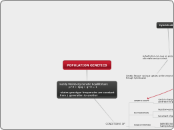POPULATION GENETICS
Hardy Weinberg Genetic Equillibrium:
p^2 + 2pq + q^2 = 1
-states genotype frequencies are constant from 1 generation to another
CONDITIONS OF
GENETIC DRIFT
random changes in allele frequencies in a population from generation to generation
NO MIGRATION
migration=gene flow
movement of genes between populations
RANDOM MATING
INBREEEDING
mating between relatives
NO SELECTION
NO MUTATION
Mutation: random changes in genetic code
Mutation is the ultimate source of GENETIC VARIATION
Leads to Species Extincitions
Abrupt Environmental Change
accounts for mass extinctions
Mass Extinction: 30-40% of species go extinct
Exploitation
Hunting
Species Introduction
Hybridization
Hybridization can save an endangered species, but it can also make one go extinct .
Genetic Rescue- saving a species on the verge of extinction through hybridization
can lead to genetic drift
Loss of habitat
GLOBAL WARMING
the increase of the global average temperature on Earth
Greenhouse Effect
the trapping of heat in the atmosphere by certain (greenhouse) gases
Greenhouse Gases
water vapor
CFC's
carbon dioxide
nitrous oxides
methane
Pollution in Ecosystems
Humans contribute to the aging of lake by increasing the nutrient level of the lake.
Farm Runoff (Fertilizer)
Laundry Detergetn/Soaps runoff into water
-addition potassium into water
Human Sewage
Subtopic
Will Lead to Health Hazards in the Furture
Mortality Rate of heat-related deaths will inrease with temperatures
Major Tropical diseases likely to spread with an increase in tempteratures; Even a modest global tmeperature increase is epxected to extend the range of vectors
higher temperatures will excaberate respiratory ailments such as asthma and bronchitis
Global Warming Displaces Species
Global Warming forces speciesto move into new eranges or alter habitats in ways that could disrupt the ecosystem.
Animals and plants that rely on one another were likely to migrate at different rates, leading to ecological disruption.
